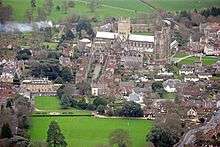city
See also: City
English
Alternative forms
- cyte (13th - 16th centuries)
Etymology
From Middle English cite, borrowed from Old French cité, from Latin cīvitās (“citizenry; community; a city with its hinterland”), from civis (“native; townsman; citizen”), from Proto-Indo-European *ḱey- (“to lie down, settle; home, family; love; beloved”). Cognate with Old English hīwan pl (“members of one's household, servants”). See hewe. Doublet of civitas.
Displaced native Middle English burgh, borough (“fortified town; incorporated city”) and sted, stede (“place, stead; city”).
Pronunciation
Audio (file)
Part of New York City, a large city with many tall buildings.

Despite its small size, Wells is a city because of its cathedral.
- IPA(key): /ˈsɪti/
- (North of England) IPA(key): /sɪtɪ/
- (US) IPA(key): /ˈsɪt̬i/
Audio (US) (file) Audio (UK) (file) Audio (AU) (file) - Rhymes: -ɪti
- Hyphenation: ci‧ty
Noun
city (plural cities)
- A large settlement, bigger than a town.
- São Paulo is one of the largest cities in South America.
- 1908, W[illiam] B[lair] M[orton] Ferguson, chapter IV, in Zollenstein, New York, N.Y.: D. Appleton & Company, OCLC 731476803:
- So this was my future home, I thought! […] Backed by towering hills, the but faintly discernible purple line of the French boundary off to the southwest, a sky of palest Gobelin flecked with fat, fleecy little clouds, it in truth looked a dear little city; the city of one's dreams.
- 2014 June 14, “It's a gas”, in The Economist, volume 411, number 8891:
- One of the hidden glories of Victorian engineering is proper drains. Isolating a city’s effluent and shipping it away in underground sewers has probably saved more lives than any medical procedure except vaccination.
- (Britain) A settlement granted special status by royal charter or letters patent; traditionally, a settlement with a cathedral regardless of size.
- 1976, Cornelius P. Darcy, The Encouragement of the Fine Arts in Lancashire, 1760-1860, Manchester University Press (→ISBN), page 20
- Manchester, incorporated in 1838, was made the centre of a bishopric in 1847 and became a city in 1853. Liverpool was transformed into a city by Royal Charter when the new diocese of Liverpool was created in 1880.
- 2014, Graham Rutt, Cycling Britain's Cathedrals Volume 1, Lulu.com (→ISBN), page 307
- St Davids itself is the smallest city in Great Britain, with a population of less than 2,000.
- 1976, Cornelius P. Darcy, The Encouragement of the Fine Arts in Lancashire, 1760-1860, Manchester University Press (→ISBN), page 20
- (Australia) The central business district; downtown.
- I'm going into the city today to do some shopping.
Hypernyms
Derived terms
- cathedral city
- citify
- citizen
- city and county
- city banker
- city block
- city boy
- city center
- city centre
- city clerk
- city desk
- city district
- city father
- city girl
- city hall
- city limit
- city line
- city man
- city manager
- city map
- city planning
- city room
- cityscape
- city slicker
- city-state
- citywide
- freedom of the city
- free of the city
- garden city
- Hanseatic city
- holy city
- inner city, inner-city
- megacity
- sister city
- the city
- twin city
Place names ending in City
- Archer City
- Arkansas City
- Ashland City
- Atlantic City
- Bay City
- Beaver City
- Center City
- Charles City
- Columbia City
- Cross City
- Dade City
- Dakota City
- Dodge City
- Forrest City
- Garden City
- Hill City
- Jefferson City
- Johnson City
- Junction City
- Kansas City
- Lake City
- Long Island City
- Loup City
- Mexico City
- Nebraska City
- Ness City
- New York City
- Oklahoma City
- Panama City
- Pawnee City
- Pine City
- Quebec City
- Quezon City
- Rapid City
- Redwood City
- Reed City
- Rio Grande City
- Rogers City
- Sac City
- Salt Lake City
- Sioux City
- Tawas City
- Traverse City
- Union City
- Valley City
- Vatican City
- Yazoo City
- Yuba City
Translations
large settlement
|
|
central business district — see central business district
downtown — see downtown
See also
Further reading
- "city" in Raymond Williams, Keywords (revised), 1983, Fontana Press, page 55.
Czech
Italian
Swedish
Pronunciation
Audio (file)
Noun
city n
- inner city, the commercial centre of a medium-sized or larger city
- Lite närmare city, i närheten av konstmuseet, ligger Norrköpings mest attraktiva lägenheter.
- A little closer to the town centre, next to the art museum, you'll find Norrköping's most attractive apartments.
- Det finns mycket att förbättra i vårt city.
- There are many things that need improvement in our inner city.
- Lite närmare city, i närheten av konstmuseet, ligger Norrköpings mest attraktiva lägenheter.
Usage notes
- centrum is used for the commercial centre of suburbs and small or medium-sized towns.
Synonyms
- centrum
- innerstad
This article is issued from
Wiktionary.
The text is licensed under Creative
Commons - Attribution - Sharealike.
Additional terms may apply for the media files.